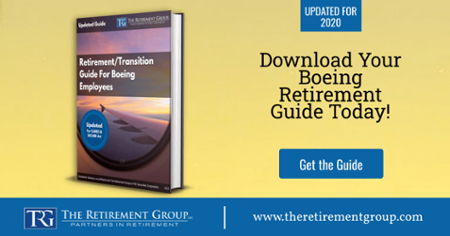We would all like to spend a little less on taxes. I was recently speaking with a Boeing client about tax strategy, and it crossed my mind that this could be useful information for all my Boeing readers. Similar strategies might also interest employees of other large corporations like Fortune 500, who often face comparable financial planning challenges. When preparing for life after Boeing, or any large company such as Fortune 500, making sure you pay the lowest possible tax rates is crucial to maximizing your nest egg. Net Unrealized Appreciation is a great way to do just that. Let’s take a look at how it works.
Net Unrealized Appreciation (NUA)
When a Boeing employee qualifies for a distribution they have three options:
Roll-over your qualified plan to an IRA and continue deferring taxes
Take a distribution and pay ordinary income tax on the full amount
Take advantage of NUA and reap the benefits of a more favorable tax structure on gains
First an employee must be eligible for a distribution from their qualified plan; generally at retirement or age 59 1⁄2, the employee takes a “lump-sum” distribution from the plan, distributing all assets from the plan during a 1 year period. The portion of the plan that is made up of mutual funds and other investments can be rolled into an IRA for further tax deferral. The highly appreciated company stock is then transferred to a non-retirement account.
The tax benefit comes when you transfer the company stock from a tax-deferred account to a taxable account. At this time you apply NUA and you incur an ordinary income tax liability on only the cost basis of your stock. The appreciated value of the stock above its basis is not taxed at the higher ordinary income tax but at the lower long-term capital gains rate, currently 15%. This could mean a potential savings of 20%. Let’s take a look at an example.
Net Unrealized Appreciation Example
Let’s assume the value of Boeing stock within your account is $500,000. The price you paid for the stock is $75,000. If you roll the entire amount to an IRA you will owe nothing in taxes presently. Over time if you were in the 28% federal tax bracket you will pay $140,000 in taxes for distributions.
If you were to take advantage of NUA you will pay ordinary income tax on the cost basis at the time of distribution. This totals $21,000 in taxes today. The tax on the Net unrealized Appreciation would be 15% of the gain, or $63,750. Your total tax liability is $84,750.
In this example NUA saved nearly 40% in taxes! A few things to keep in mind:
Boeing employees taking a distribution prior to age 59 1⁄2 may be subject to a 10% penalty.
NUA makes more sense when employees have a low cost basis.
It is important to take advantage of NUA prior to a rollover. Once you roll retirement assets to an IRA it is too late to take advantage of the potential savings. To qualify, you must be eligible for a lump-sum distribution of your entire qualified account.
Stock shares must transfer in-kind to a taxable account. This means that the shares must not sell but must move from your qualified account into your new taxable account.
Net Unrealized Appreciation can be used in certain circumstances to save a substantial amount in taxes. While this example uses Boeing stock, it's worth noting that employees from other companies, such as Fortune 500, facing similar decisions can also benefit from understanding these concepts. Make sure that you consult with your tax and financial professionals to ensure that this is a good fit.
Want to learn about the different stages of retirement? Visit: https://techstaffer.blog/2019/11/14/boeing-stages-of-retirement/
If you’d like to read about survivor benefits, visit: https://techstaffer.blog/2019/11/28/survivor-checklist-how-your-spouse-can-receive-boeing-benefits-after-your-death/
Wondering if you should work in retirement? Visit: https://techstaffer.blog/2019/12/05/life-after-boeing-should-i-work-in-retirement/
Sources:
The Retirement Group or www.theretirementgroup.com
“Retirement Plans-Benefits & Savings.” U.S. Department of Labor, 2019, www.dol.gov/general/topic/retirement.
“Generating Income That Will Last throughout Retirement.” Fidelity, 22 Jan. 2019, www.fidelity.com/viewpoints/retirement/income-that-can-last-lifetime.
BA Summary Plan Description, 2017




